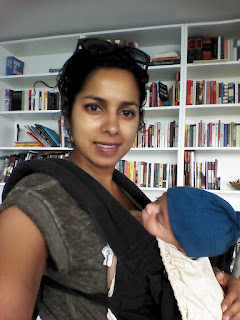The biggest adventure in my life so far has been the birth of my daughter, Shirin. She was born on May 24th and is named after my grandmother who recently passed away. As the APLPers with kids (Hafiz) know, children can really change your life. And Shirin certainly has. I've been on maternity leave for 10 weeks now just getting used to her routine and exploring my new neighborhood of Brooklyn.
However, it is hard for me to stay far from my work. So when Shirin was 7 weeks old, she, Mark, and I went to San Francisco for the World Futures Society annual conference. I spoke about the future of the retail industry in the US and a project I've been working on.
I also attended a lot of interesting sessions. Three of the topics discussed would be interesting to the rest of G12.
1. First I attended a talk on FOOD DESERTS. Food deserts refer to areas in which access to food is impossible due to logistic and economic reasons. Many Americans live in these food deserts and can't get fresh food. There is also the concept of a "food swamp", an area where there are tons of fast food restaurants but no places to get healthy food. Solving the problem of food deserts, now, and in the future, is a tricky one. The name implies a supply side problem - lack of stores selling food, but the issue is one with both supply and demand side problems. One of the highlighted solutions included grocery stores working with the communities in which they operate to create stores that will best serve them. By involving the community in decision making, and asking them what they want (cultural foods, cooking classes, etc.) great progress can be made.
2. I then went to play the IMMORTALITY GAME, a negotiation based game on the topic of human immortality. Remember the country negotiation game that I, and other members of G12 created (Megan and Matt I think)? This was very similar. In the game, the group broke up into small groups of 5. In our small group we were presented with the following scenario:
A large US pharmaceutical company has created a drug that can stop aging. It doesn't make you immortal, it simply stops aging so you can still die from an accident, cancer, and so on. You may be 60, but every year you take the drug, you will be frozen in time. So if you take the drug every year from age 25, you will look 25 for 35 years and your body will behave like that of a 25 year old. The drug has been tested for 10 years and passed clinical trials. Should it be released to the public?
Each table had to discuss, vote yes or no, and add any stipulations. Like with many futures scenarios, the game itself was a hypothetical situation, but brought up a deeper conversation on population control, the aging population, economic inequality, and other issues.
3. Finally, I went to workshop on the future of PRO BONO. There are a small group of companies that operate as for-profit companies but give away some of their work pro bono. The business model was a bit complicated, but the companies that use this model find that the pro bono work can make employees more passionate about the paid work. The free work also enables people to experiment, something I can attest to and feel like I took advantage of during APLP.
All of these sessions seemed very relevant to the things we learned in APLP. It might seem odd that I'm still so involved in futures stuff while on leave, but I see the two as very related. After all, having a child is a very long term futures endeavor. I think about what the world is going to be like when she graduates from college in 2037, and I hope that it is one filled with hope and wonder.


No comments:
Post a Comment
Thank you for your comment!